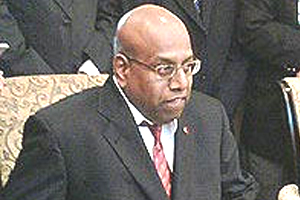-Dr. S. Ramakrishnan, January 23, 2015.
 Malaysians are hard-pressed and at a loss as to the increasing cost of living when the international oil price has dropped rock bottom. In May 2014, the prime minister announced that with the high cost of fossil fuel, the government had no choice but to raise electricity tariffs by 15%. But when the fuel price dropped from US110 to US50 per barrel, all he could do was to postpone the next hike. Tenaga National Bhd’s latest earnd profit jumped 34.37% to RM2.34 billion.
Malaysians are hard-pressed and at a loss as to the increasing cost of living when the international oil price has dropped rock bottom. In May 2014, the prime minister announced that with the high cost of fossil fuel, the government had no choice but to raise electricity tariffs by 15%. But when the fuel price dropped from US110 to US50 per barrel, all he could do was to postpone the next hike. Tenaga National Bhd’s latest earnd profit jumped 34.37% to RM2.34 billion.
On another note Putrajaya increased the price of RON95 from RM1.90 to RM2.10, and then reduced it to RM1.91. Malaysians did not experience a retail price reduction. School buses and transport charges have gone up. A wretched public transportation system has turned car ownership into a necessity. The prices of goods and services did not drop even in view of the global drop in oil prices. Consumers are the suckers and never the concern of the government.
The general public were waiting for some sweetener from the finance cum prime minister. Alas, came disappointed. The finance minister did little to address the people’s concern. Malaysia recently faced its worst flooding in decades. Why there was no warning regarding the incoming monsoon winds and cloud movements. The finance minister never questioned this blunder of the agencies and instead announced a relief fund of about RM900 million. How did he come out such an astonishing amount in such a short period? He failed to make any announcements on steps to be taken in improving flood management and relief efforts. He could have announced the formation of a royal commission of inquiry in dealing with the catastrophe.
The finance minister also missed an opportunity to address the structural deficiencies in the economy – the bloated civil service, in this context. The finance minister announces an outcome based budget. Therefore when he announce a budget revision he should have announced the outcomes achieved or about to achieve. Outcomes are never announced. Ministry of education receives the highest allocation every year. But the quality of education is sliding downwards every year too. Internal security and policing always get priority. But public security and safety is becoming worse by the day. We have a national unity department for very long but the outcome is extremism and fundamentalism. The so-called outcome-based budget has achieved very little in terms of outcome.
Despite the government’s spending billions as provided in every Budget, the rural and urban Malays remain the poorest among those in the bottom 40% of households. A large amount was allocated for the upgrading of skills of the workforce, including RM1.2 billion for the Vocational and Technical Transformation Programme. But only 28% of our workforce is technically skilled as compared to those in other developing countries – around 45%. Malaysia has a target of at least 50% in terms of a skilled workforce in 2020. While the government has never hesitated in spending to achieve these targets, they are hardly achieved and often, no one is held accountable.
The finance minister should stop the tabling of supplementary budget in every parliamentary sitting. It reflects poor financial planning. Malaysia is the worst affected country in the drop in international oil price. Besides the 16 years of continuous fiscal deficit, the current account surplus too is reducing. The finance minister has expressed his concern on our capacity to meet the current obligations. Malaysia is becoming a higher risk market. There must be drastic change and departure from past bad practices. Is the finance and prime minister bold enough to make radical changes to the way the economy is managed? He needs to emerge triumphant against the fiscal deficit, reducing current account, weaker ringgit and dropping revenue. He did say much in the revised budget. It’s business as usual.
























